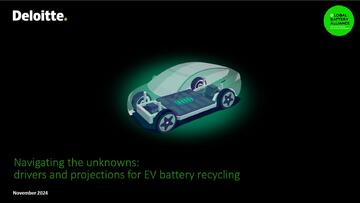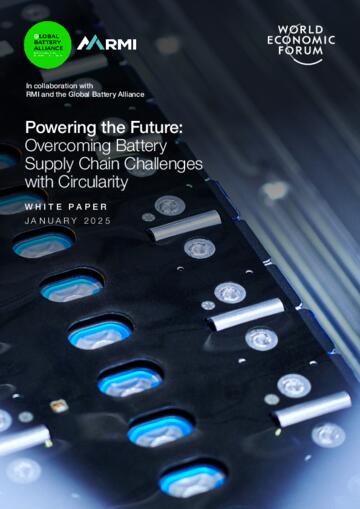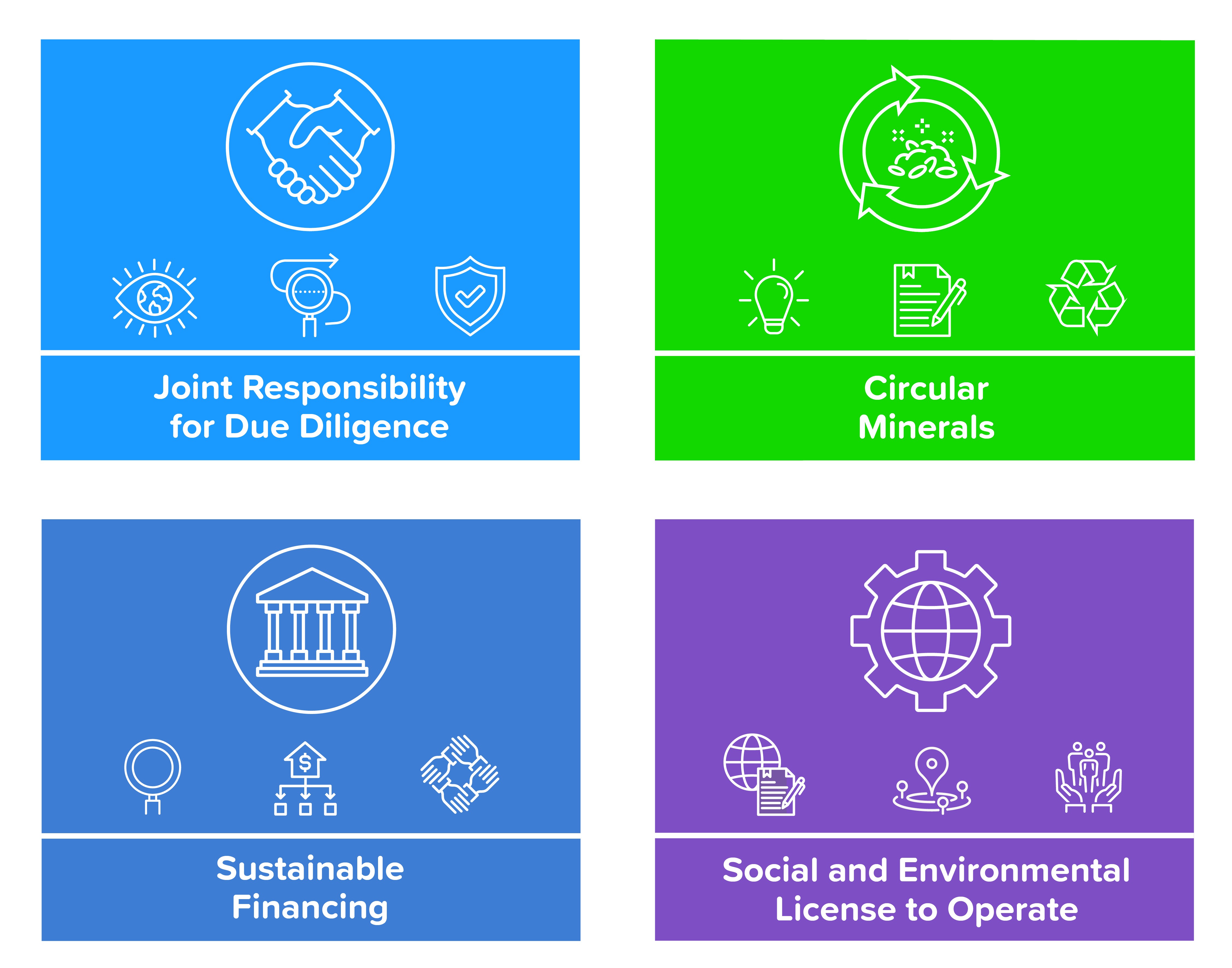Circularity & Critical Minerals Advisory Group (CCMAG)
By virtue of providing the critical raw materials for batteries, minerals such as cobalt, nickel, lithium, and graphite play an essential role enabling the transition to green energy and transport. Establishing battery value chains that are sustainable, circular and just is at the heart of the GBA’s mission.
CCMAG provides a unique platform for public-private engagement on sustainable battery minerals in a politically neutral setting.
It is conceived as a thematic dialogue space led by partners/ members, dedicated to exploring trends and gaps around sustainability & circularity in the mineral battery supply chain.
Our intended impact:
- Deepen GBA multistakeholder collaboration in a pre-competitive space
- Strengthen the engagement of mineral-rich country governments and suppliers with GBA work on the Battery Passport through capacity building on ESG requirements and inclusion of socio-economic development objectives
- Develop thought leadership, guidance and policy briefs on circularity, recycling, and emerging value chain sustainability questions
The Communiqué Policymakers to bridge the cooperation
gap in critical battery minerals with harmonised data and transparency identifies CCMAG’s priority action areas for 2025-2027.
Circularity knowledge collaboration white papers developed during 2024
Navigating the unknowns: drivers and projections for EV battery recycling, in collaboration with Deloitte, Belgium

Objectives:
- Identifies key drivers for management of retired EV batteries
- Uses an analytical model to estimate projections related to battery recycling
- Captures uncertainties in battery recycling as sensitivity analyses
Scope:
- Lithium-ion batteries for electric vehicles
- Modelling focused on the EU, insights on regional differences for USA and China
Powering the Future: Overcoming Battery Supply Chain Challenges with Circularity, in collaboration with World Economic Forum and the Rocky Mountain Institute

Objectives:
- Examines challenges in the battery supply chain
- Identifies systemic changes needed to foster a circular battery economy
- Underscores need for harmonised policy frameworks
Scope:
- Lithium-ion batteries for electric vehicles
- Focussed on manufacturing phase onwards
Governance
The Circularity & Critical Minerals Advisory Group initiative is governed by a Steering Committee. It guides strategic decision-making made up of GBA members representing a balance of industry, civil society, governments, and academia.
CCMAG Steering Committee:
- Yamin Zheng, AESC
- Xiao Lin, Botree
- Stefano Sacco, Centro de Movilidad Sostenible
- Susannah McLaren, Cobalt Institute
- Luke Hu, Electroder
- Ela Yilmaz, European Bank for Reconstruction and Development (EBRD)
- Tim Schlosser, GIZ
- Grégoire Bellois, International Institute of Sustainable Development (IISD)/Intergovernmental Forum on Mining, Minerals, Metals and Sustainable Development (IGF)
- Andrea di Masi, SQM
- Andrew Deadman, The Faraday Institute
- Sudeshna Mohanty, Rocky Mountain Institute
- Anne-Marie Suriano, Rio Tinto
- Gillian Davidson, Resolve
- Sebastian Pohlmann, UP Catalyst
- Ke Wang, World Resources Institute
- Bao Wei, Zhejiang Huayou Recycling Technology Co., Ltd.
Secretariat:
- Inga Petersen, Executive Director, GB
- Kaisa Toroskainen, Programme Manager, GBA
- Pramoda Gode, Programme Manager, GBA
- Creta Gambillara, Communications & Outreach Advisor, GBA
- Jennifer van Niekerk, Administrative Coordinator, GBA
Cobalt Action Partnership (2020-2021)
Cobalt is a raw material in the production of cathodes for these batteries due to its stabilizing effect that prevents corrosion. An estimated 50% of the world’s cobalt mine reserves are in Democratic Republic of the Congo, where artisanal and small-scale mining (ASM) has been linked to the risk of child labor.
In 2020-2021, the GBA convened a comprehensive global stakeholder consultation process on the Artisanal and Small-scale Mining (ASM) Cobalt Framework as part of the Cobalt Action Partnership (CAP) to immediately and urgently eliminate child and forced labor from the cobalt value chain, contribute to the sustainable development of communities, and respect the human rights of those affected (pursuant to GBA Principle #8).
Eliminating child labor requires concerted action on a wide variety of fronts. The Cobalt Action Partnership focused on the following actions:
- Supporting responsible production and sourcing of Congolese cobalt, through:
- Establishing a common set of expectations for responsible cobalt across the value chain, and
- Developing a common monitoring and evaluation framework
- Supporting formalization of the cobalt ASM industry in the DRC, through:
- Driving investment and engagement toward on-the-ground projects and scaling-up efforts
- Identifying best practices within cobalt ASM supply chains that can be replicated and scaled, and
- Facilitating stakeholder engagement to foster responsible cobalt production and trade practices.
- Harmonizing our members’ initiatives for greater impact, through:
- Facilitating multi-stakeholder dialogue for sharing, learning, and leveraging collaboration.
To achieve our objectives – with a unified voice to increase scale and the impact of our individual and collective efforts – we conducted the following activities in partnership with our stakeholders:
- Engagement. Coordinating international stakeholder engagement on responsible cobalt production practices and sourcing expectations for both ASM and LSM to facilitate the necessary legitimacy and recognition by the market.
- Dialogue. Organizing multi-stakeholder dialogue and consultation in the cobalt supply chain to create spaces for sharing, learning, and leveraging collaboration.
- Measuring and Reporting. Facilitating a means for stakeholders to report ongoing projects into a common monitoring and evaluation framework.
- Best Practices. Fostering the identification of best practices within ASM supply chains that can be replicated, scaled, and attract funding.
- Mutually Recognized Expectations. Establishing one common set of best practices and minimum standards for ASM cobalt, by leveraging existing standards, thus creating a shared understanding of key principles in the market that addresses local priorities.
- Leveraging Funds. CAP supported the creation of a Fund for the Prevention of Child Labour in Mining Communities to address the root causes of child labor and forced labor, strengthen mining communities, respecting the human rights of those affected by the value chain, and promoting local economic opportunities and diversification.
The report summarizing the key takeaways of the stakeholder consultation is available here.
Building on the successful multistakeholder process enabled by the GBA, piloting and implementation of the Framework were graduated to a GBA partner organization, the Responsible Minerals Initiative (RMI). In July 2022 the GBA and the RMI co-funded a series of restitution workshops in the Democratic Republic of Congo (DRC) to provide local stakeholders with an update on the framework prior to the RMI proceeding with piloting.
Governance
The Cobalt Action Partnership was managed by a Project Management Office. Decision-making was guided by a Steering Committee made up of voting members, including GBA members and government representatives, and non-voting observers (international organizations and government representatives).
Project Management Office: The Responsible Minerals Initiative (RMI), an initiative of the Responsible Business Alliance (RBA).
Steering Committee:
- Private Sector:
- Gillian Davidson, Eurasian Resources Group (ERG)
- Anne-Marie Fleury, Glencore
- NGOs:
- Cristina Duranti, Good Shepherd International Foundation
- Mickael Daudin, Pact
- Government:
- Esma Mneina, Natural Resources Canada
- Observers:
- Geneva Centre for Security Sector Governance (DCAF)
- International Labour Organization (ILO)
- Organisation for Economic Co-operation and Development (OECD)
- International Committee of the Red Cross (ICRC)
- Gesellschaft für Internationale Zusammenarbeit/ Society for International Cooperation (GIZ)
- United States Embassy in the Democratic Republic of Congo
Implementing Partners:
The Cobalt Action Partnership was led and supported by a consortium of organizations that have expertise, field presence, and programs that are aligned with and contribute toward the initiative's mission.
- Fair Cobalt Alliance (FCA)
- International Institute for Environment and Development (IIED)
- United Nations Children's Fund (UNICEF)
The GBA brings together leading organizations along the entire battery value chain.
